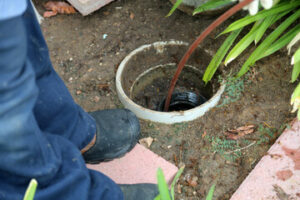When your home’s sewer line is damaged, it can lead to a variety of problems. If you have spotted signs of a broken line, like squelching sounds when walking in your yard or smelly sewage odors inside your home, contact a plumber for repair as soon as possible.

A professional plumber has the tools and experience to diagnose and fix your sewer problem correctly, using either traditional trench methods or trenchless technologies. Visit https://www.plumbing-express.com/ to learn some of the benefits of working with a plumber to repair your damaged sewer lines:
A leaking sewer line isn’t just an annoyance – it’s a health hazard. Dampness around the home attracts pests and invites mold to grow, which can negatively impact the health of family members. Children and seniors are particularly susceptible to the mold spores that develop in damp areas. A professional plumber should address the situation immediately to prevent the growth of dangerous fungus and bacteria that can cause serious health problems.
Leaks aren’t easy to detect as they typically form underground, but a number of signs can indicate a problem. For example, unexplained puddles of wastewater around your property or the house itself is a clear sign that a sewage drain has cracked or ruptured. Other indications include a sudden and unexplained drop in water pressure or the smell of rotten eggs (which is caused by a chemical that is released when pipes break down).
Over time, clogged drains can lead to leaks. This is because debris like food scraps, baby wipes, grease, and hair find their way down the drain and can eventually build up. In addition, tree roots can also cause issues because they are naturally drawn to water and will eventually seep through cracks in a sewer pipe.
Another big warning sign that you have a sewer leak is an unexpected spike in your water bill. While it is normal for water bills to rise slightly as seasons change, a huge jump in your monthly expenses is a sign that something is wrong and that a plumber needs to be called right away.
A faulty or damaged sewer line can also result in raw sewage backflow, which can destroy plumbing fixtures and create a major mess in your home. In the worst case scenario, a broken sewage line can lead to the overflow of raw sewage into your basement and throughout the rest of your home. This can cause a lot of damage and make it unsafe for family members to be in the area. A plumber will need to be consulted immediately to perform a thorough inspection and begin the necessary repairs.
Mold
Mold growth in a home often indicates an underlying moisture problem that requires professional plumbing repairs. A clogged drain or sewer backup creates a damp environment that encourages mold development. Leaking pipes also dampen permeable building materials, such as walls and floors. Mold releases harmful spores that compromise indoor air quality and can lead to serious health problems.
An unexplained increase in pest activity is another common sign of sewer line issues. Rodents, such as rats and cockroaches, live in sewers and gain entry into homes through cracked or broken pipes. If an exterminator can’t get rid of a pest infestation, it may be time to call for a sewer line inspection.
A clogged drain or a broken pipe can cause water to pool in the yard. This excess moisture can damage landscaping, foundations and driveways. A plumber can determine the severity of the leak and recommend an appropriate repair method.
Water and sewage leaks can also soak into the ground, causing soil to sag or dip. This can affect the stability of outdoor features like patios and driveways, and may even result in sinkholes.
When the structural integrity of a home is compromised, a plumber may suggest a complete sewer line replacement. This can be done through a trenchless method or traditional excavation. The plumber can also recommend a solution that prevents future leaks and repairs, such as cured-in-place pipe (CIPP).
Keeping up with routine drain cleaning can help keep a home’s sewer lines healthy and free of obstructions. Proper disposal of paper products, grease and feminine hygiene products is also important to minimize blockages. Regular plumbing maintenance also helps to reduce moisture in the home, which can prevent mold and other problems. Adding dehumidifiers to basements and installing ventilation fans in bathrooms and kitchens can lower indoor humidity levels, further discouraging mold growth. A plumbing service can provide tips on preventing clogs and leaks, such as using drain covers in showers and toilets and maintaining a one-inch gap between appliances. A plumbing professional can also help homeowners determine if their home insurance policy offers a sewer back-up endorsement.
Damaged Foundation
If your sewer line breaks at the foundation, it can cause damage to the house. This is because the sewage will leak into the soil around the foundation and may push up against it. This can also cause the foundation to crack and sink. If you see any cracks in the foundation, it is important to call a plumber right away to get it repaired.
The plumber will need to use special tools to access the broken pipes under the foundation, so it is best if you hire a professional plumbing company that specializes in sewer issues and repairs. They will know exactly what tools to use and how to use them safely so they do not cause any further damage or disruption at your home.
To start the repair process, the plumber will dig an access hole in the front yard and then begin tunneling underneath the foundation. They will follow the pipe to find where it is broken, and then they will break up the old sewer line and remove it from the system. They will then install a new one in its place, and then they will connect it to your house’s plumbing system.
In some cases, it will be easier to do a trenchless repair instead of digging up the whole foundation and breaking up the old line. This option is typically much cheaper. However, the plumber will need to carefully inspect the area to make sure they are not going to hit any underground utilities or other structures that cannot be replaced.
It is also important to check the interior of your house for signs of a broken sewer line. Look for any water damage, especially mold that is growing on the walls. This is a sign that there is moisture in the soil surrounding the foundation, and it needs to be addressed as soon as possible.
There are also other signs that your sewer line is damaged, including sagging floors and a basement that seems too damp to be safe. You may also notice that doors and windows do not open or close properly. The most serious symptom is that your foundation is sinking or shifting, which can be very dangerous for your family.
Pests
A broken sewer line can attract pests to your home. Insects are attracted to water and food, which is why leaky plumbing equipment is a prime draw for bugs and rodents. Pests that are drawn to leaking pipes and other plumbing problems include drain flies, roaches, rats and more. The best way to avoid these unwanted guests is to get your plumbing fixed as soon as you notice a problem.
Pests that move in through a cracked sewer line can cause extensive and expensive damage to your home. Rodents and other rodents love to live in sewer lines because they offer protection from weather and other dangers. They can also breed and find a continuous food source in the organic slime that builds up in drains and other parts of your plumbing system.
Cockroaches are another common pest that loves to thrive in damp, dark areas. Cracked sewer lines provide a perfect entry point for these insects, which can then eat away at the foundation of your home and lead to more serious problems.
Leaky pipes are a perfect environment for drain flies to breed in, as well. If your toilet’s P-trap is empty, it means that sewage is flowing into your home’s drains unabated. Flies love the scummy, wet and dark conditions of your drain pipes and can quickly breed in these locations.
Cracked sewer lines can allow cockroaches and other pests to enter your home through the basement, crawl space or walls. These pests can cause serious health issues for your family.
Putting in a screen on your vent stack is an easy way to keep pests from getting into your plumbing and other parts of your house. This is especially important if you have an older vent stack that’s prone to clogs.
Plumbing and pest problems tend to converge into one big disaster, and if you let them persist, they could cost you thousands in repairs in the future. So make sure to fix your plumbing problems and get your pest control under control simultaneously. This will ensure that your home is protected from both serious pest infestations and costly damages.
